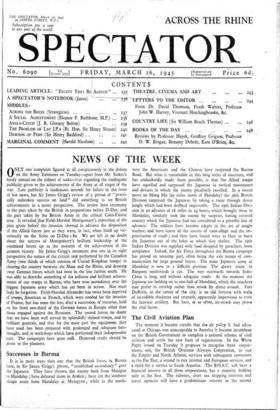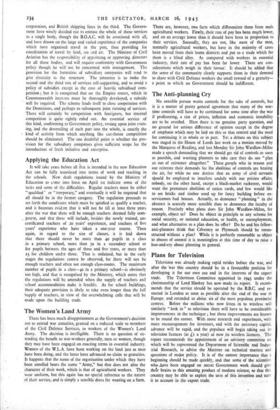The Civil Aviation Plan
The moment it became certain that the air policy it had advo- cated at Chicago was unacceptable to America it became incumbent on the British Government to complete a national scheme of civil aviation and settle the new form of organisation. In the White Paper issued on Tuesday it proposes to recognise three corpor- ations, one, the British Overseas Airways Corporation, to run the Empire and North Atlantic services with subsequent extensions to the Far East, a second to run internal and European services, and a third for a service to South America. The B.O.A.C. will have a financial interest in all three corporations, but a majority holding only in the first. The railways, short sea shipping interests and travel agencies will have a predominant interest in the second corporation, and British shipping lines in the third. The Govern- ment have wisely decided not to entrust the whole of these services to a single body, though the B.O.A.C. will be associated with all, and have drawn on the large and varied experience of the companies which have organised- travel in the past, thus providing for coordination of travel by land, sea &nd air. The Minister of Civil Aviation has the responsibility of appointing or approving directors for all these bodies, and will require conformity with Government policy though, he will not be concerned with management. The provision for the formation of subsidiary companies will tend to give elasticity to the structure. The intention is to make the second and the third sets of services self-supporting, and to avoid a policy of subsidies except in the case of heavily subsidised com- petition; but it is recognised that on the Empire routes, which in Commonwealth interests must be thoroughly developed, a subsidy will be required. The scheme lends itself to close cooperation with the Dominions, and perhaps to subsequent joint running of services. There will certainly be competition with foreigners, but internal competition is quite rightly- ruled out. An essential service of this kind, conforming to Government policy, resting upon joint train- ing, Ind the dovetailing of each part into the whole, is exactly the kind of activity from which anything like cut-throat competition should be eliminated. The one doubtful point is whether the pro- vision for the subsidiary companies gives sufficient scope for the introduction of fresh initiative and enterprise.



























